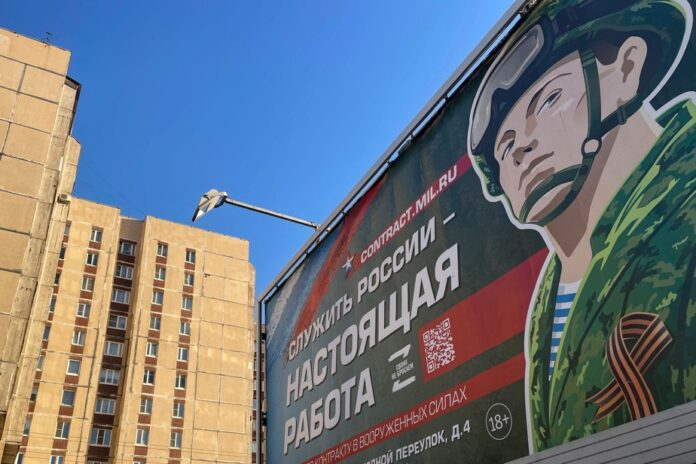(Moscow) “You are a man. Be it.” For several days, whether on the streets or on social networks, Russians of fighting age have not been able to escape advertisements encouraging them to enlist in the army to fight in Ukraine.
Objective: to replenish thinned ranks as Kyiv says it is preparing a vast counter-offensive, without resorting to a new forced mobilization, an unpopular measure that the Kremlin took in September after several setbacks.
To spare public opinion, the government has therefore launched the largest advertising campaign for voluntary military recruitment since the launch of its offensive against Ukraine in February 2022.
In Moscow, plastered along roadsides, on shop windows and on bus shelters, recruitment posters have flourished in recent days, touting “an honorable job and a decent salary”.
The authorities have not announced quantified targets, but some Russian media have reported that the army hopes to enlist several hundred thousand men by offering contracts on particularly attractive terms.
On the website of the Moscow municipality, the salary promised to a recruit deployed in the area of operations in Ukraine thus amounts to 204,000 rubles (2,260 euros at the current rate), or more than 10 times the minimum wage.
Those who take part in an offensive action are also promised a daily bonus of 8,000 rubles, and 50,000 rubles for each kilometer conquered within an assault brigade, a formation more exposed to enemy fire.
“In Russia, it’s a good sum to support your family, and even your parents. It makes sense: if a person is defending their homeland, why shouldn’t they be paid? 21-year-old student Piotr Lipka told AFP.
“Enlisting under contract is better” than being drafted, continues the student from Volgograd, the former Stalingrad.
On the posters, no combat scene, the conflict in Ukraine seems far away. “Our job, defending the homeland” boasts a poster showing three soldiers under a big blue sky.
A viral video on social media shows a taxi driver, a security guard and an exercise coach mired in a dreary daily life.
“Is this really the path you wanted to choose?” “, asks the video. At the end, the three men fulfill themselves by choosing the fatigues and the assault rifle. A slogan appears: “You are a man. Be it. »
Yevgeny Krapivin, 41, was a professional soldier in his youth. Asked by AFP in Moscow, he said he would like to get involved again, but fears that his age will be a problem.
“When I asked, I was told, ‘You’re 41, we’re not going to take you,'” he said. Then, after going through several commissions, “I was told, ‘Wait, we can call you anytime’.”
At the same time as the launch of this campaign, President Vladimir Putin recently passed a law, in just two days, to facilitate a new mobilization, which has raised fears.
The first “partial” mobilization of hundreds of thousands of Russians in September caused tens of thousands, perhaps more, to flee abroad.
With the voluntary recruitment campaign, the government wants to “avoid a new shock”, Denis Volkov, director of the independent study center Levada, told AFP. “People are like, ‘It’s their business, their choice'” to enlist.
The launch of this campaign also coincides with preparations for the May 9 commemorations celebrating the victory over Nazi Germany in 1945, a time of patriotic fervor.
While the campaign is unlikely to meet with success in major cities like Moscow or St. Petersburg, where joining the army is seen as “a waste of time”, it could have a wider resonance in the region, believes Mr. Volkov.
In addition to the attractive remuneration to compensate for a “dysfunctional social elevator”, the point of view according to which “it is good for every man to serve (in the army), it is a school of life” remains significant there, underlines he.
And in a predominantly patriarchal society, where the man is encouraged to provide for the needs of his family, the arguments put forward hit the mark.
In Moscow, the elderly parents of recruits are thus offered home care, and mothers free places in crèches.
Even in the event of death, recruits are promised to be able to shelter their families, with compensation of several million rubles.


















